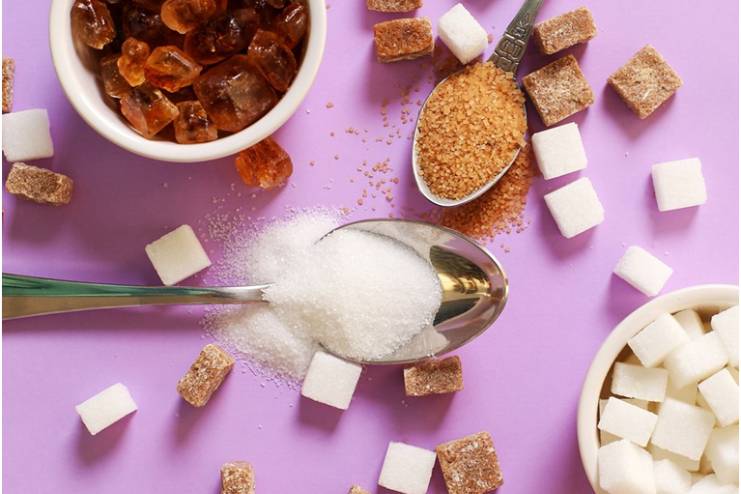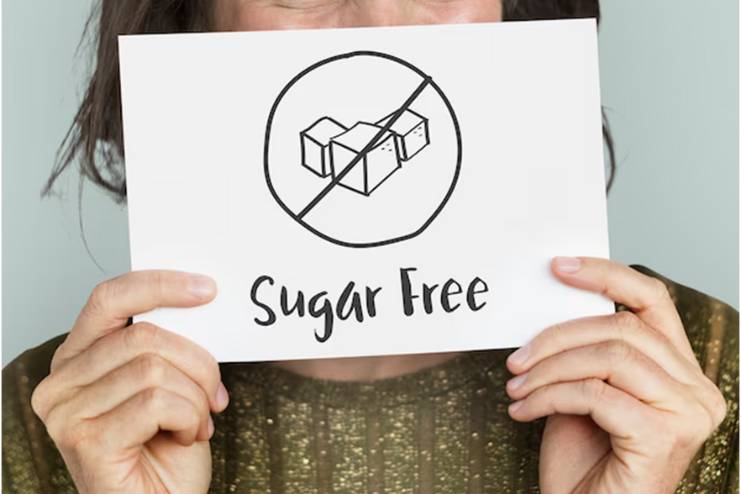Affiliate Disclaimer
Some links in this article are affiliate links. We may earn a small commission if you make a purchase through these links, at no extra cost to you. We only recommend products we find useful to our readersSugar is used globally and is the most common part of the modern diet. Yet, it is responsible for being one of the primary factors for obesity, diabetes, and other chronic conditions. A shocking survey found that an average American consumes about 17 teaspoons (71.14 grams) of sugar daily. This means about 57 pounds of annual added sugar per person. This has transitioned the world to sugar substitutes and spiked interest in zero-calorie sweeteners.
What Are Zero Calorie Sweeteners?
By law, a sweetener may be labeled calorie-free, no-calorie, or zero-calorie if it provides less than 5 cal per serving. One serving has sweetness equivalent to 1 or 2 teaspoons of table sugar. This serving can include either teaspoons, drops, or squeezes.
We find zero-calorie sweeteners everywhere, mostly in granulated, powdered, or sachet forms. They also come in cubes, syrups, sachets, tablets, liquids, or syrups. Zero-calorie sweeteners are available in various forms: granulated, powdered, sachets, cubes, tablets, liquid, and syrup.
Sugar substitutes are found in everything, including desserts and sodas. They are often deemed guilt-free, especially for people with diabetes. However, as they become more popular, ensuring their safety for your health becomes critical. It is essential to understand if zero-calorie sweeteners are the better option or if they’re just another popular trend with side effects.
In this article, let’s understand the world of zero-calorie and artificial sweeteners, their risks, types, risks, benefits, and a few tips. By the end, you will have the proper knowledge to make better and more informed decisions about these sugar substitutes.
Types Of Zero Calorie Sweeteners:

You have two choices when we try to understand if you want to opt for Zero-calorie sweeteners. As zero-calorie sweeteners can be broadly categorized into natural and artificial sweeteners
Natural Sweeteners v/s Artificial Sweeteners.
Natural Sweeteners:
- Stevia: Stevia is a natural sweetener that is quite popular among Americans and globally. It is extracted from the leaves of the stevia rebudiana plant. Stevia is an excellent choice for people watching their weight. It has about 200-400 times more sweetness than sugar yet contains no calories. People who wish to keep their sugar levels under control opt for stevia. Stevia is also known to have potential antioxidant
- MonkFruit: Monk fruit sweetener is derived from the Siraitia grosvenorii fruit. Monk fruit sweeteners contain mogrosides, natural compounds that provide sweetness and do not impact blood sugars.
Natural sweeteners include fruit pulp, agave, honey, and cane sugar.
Artificial Sweeteners:
- Aspartame: Aspartame is one of the most widely used sweeteners in diet sodas. Aspartame is 200 times sweeter than sugar. Though it is FDA-approved, there are still concerns about its long-term safety.
- Sucralose: Sucralose is a heat-stable sweetener, often preferred by bakers. However, studies suggest it may alter gut microbiota.
- Saccharin: Saccharin is known to be one of the oldest artificial sweeteners. This is another form of artificial sweetener and is popular as it is calorie-free. The benefits are debatable since studies have found it to be responsible for bladder cancer.
Benefits Of Zero Calorie Sweeteners

If you seek healthier alternatives to sugar while acting as a sugar substitute, they are preferred if you want to control diabetes, manage weight, and have a balanced diet.
- Weight Management:
According to the Mayo Clinic, one can of diet soda rather than a sugar-sweetened drink can help you cut about 140 calories per day. Over a year, you can drastically prevent weight gain of 14 pounds. People aiming to manage their weight often prefer zero-calorie sweeteners to maintain their sugar-free diet. - Diabetes Control:
People with diabetes find it challenging to avoid sugars. They crave sweetness, and natural sweeteners help them with this. They can opt for stevia or monk fruit sweeteners, which have minimal impact on blood sugar and insulin levels. A study found that non-nutritive sweeteners have helped reduce after-meal blood sugar spikes by 18-20% compared to sugars. - Oral Health:
Zero-calorie sweeteners do not feed oral bacteria, unlike sugar. This can prevent tooth decay and improve oral health, making them a teeth-friendly sugar substitute. As per research, when you switch from sugars to sweeteners, you can reduce cavities by 30-40%
Potential Artificial Sweetener Risks And Controversies
- Gut Microbiota:
Artificial sweeteners like sucralose and aspartame may negatively impact your gut health. These sweeteners alter gut microbial imbalance, leading to dysbiosis. These reduce the good gut bacteria by 50%, as observed over 12 weeks, and contribute to metabolic disorders. - Cravings And Overeating:
Zero-calorie sweeteners are known to provide sweetness without calories. However, artificial sweeteners might cause your brain to crave more sugary foods. Individuals who consume artificial sweeteners are 23% more likely to snack on sugary and high-calorie foods later in the day. - Long Term Safety:
Even though regulatory bodies deem artificial sweeteners safe, they have many risks. The long-term side effects of sucralose and aspartame have always been controversial. The WHO recently declared aspartame ‘possibly carcinogenic,’ making us doubt artificial sweeteners.
Are Zero-Calorie Sweeteners Better?
The debate on their safety continues. However, a few benefits make people still prefer artificial sweeteners. When compared to sugar, zero-calorie sweeteners have:
- Calories: The primary reason to opt for an artificial sweetener is their calorie-free property. Sugar has four calories per gram, whereas these artificial sugar substitutes have zero.
- Blood Sugar Impact: The blood sugar is not spiked instantly when you consume artificial sweeteners. They don’t cause the rapid blood sugar spikes associated with sugar consumption.
- MetabolicHealth: While no immediate negative impacts exist, their long-term effect is still debatable. Zero-calorie sweeteners are helpful for diabetics if included in a balanced diet. Stevia and monk fruit are non-nutritive sweeteners with less impact on blood sugar.
Replacing a high-calorie sugary beverage with a diet drink benefits people. Such swaps can help diabetics, fitness enthusiasts, or those who wish to shed weight. However, remember not to over-rely on these artificial sugar substitutes and use them cautiously. As mentioned earlier, these affect gut health and metabolism, so we must ensure a proper balance of sweeteners and a balanced diet.
Expert Recommendations And Sugar-free Diet Tips

If you wish to include artificial sweeteners, here are a few recommendations from the experts on sugar-free diet tips:
Expert recommend:
- A balanced diet with whole foods is essential and cannot be replaced by zero-calorie sweeteners. Use zero-calorie sweeteners sparingly, as they might impact your health long-term.
- Zero-calorie sweeteners are known to increase the risk of physical and mental health disorders.
- Longer use of artificial sweeteners may also result in stroke or heart disease.
- They influence people’s taste as they no longer like the original sugary taste.
People with specific conditions can benefit from natural sweeteners. Here are a few tips to help you add fewer calories yet more sweetness to your diet:
Practical Tips For Using Sweeteners
- Pair Sweeteners With Whole Foods: You can combine sweeteners with nutrient-rich food, fruits, and whole meals.
- Limit Dependency: Do not depend excessively on sweeteners, which will impact your taste buds. Retain your taste and enjoy natural sweeteners more.
- Experiment With Natural Options: Experiment with ingredients and use natural sweeteners in hot or cold beverages, cakes, meals, and snacks.
- Natural Alternatives:
There are various natural sugar substitutes, and you must switch to them. Natural sweeteners include stevia, date sugar, coconut sugar, monk fruit, agave, and honey.
Conclusion
Zero-calorie sweeteners are an option for maintaining sugar spikes or weight issues. However, artificial sweeteners are only sometimes an excellent choice. There are potential gut health risks, sugar cravings, and long-term physical and mental health problems when you excessively use artificial sweeteners.
You must make informed choices, understand the possible risks, and not solely depend on these substitutes. The sugar substitutes are not a forever fix. You must include more natural sugars in your diet, as these best align with your health goals. Always have balance, as this is the key to a healthier lifestyle.
References
- https://nutritionsource.hsph.harvard.edu/carbohydrates/added-sugar-in-the-diet/
- https://www.whatsugar.com/decoding-sweetener-cost
- https://pmc.ncbi.nlm.nih.gov/articles/PMC3198517
- https://www.mayoclinic.org/healthy-lifestyle/nutrition-and-healthy-eating/in-depth/artificial-sweeteners/art-20046936
- https://pmc.ncbi.nlm.nih.gov/articles/PMC3198517/
- https://www.nature.com/articles/ejcn2009133
- https://www.healthline.com/nutrition/artificial-sweeteners-good-or-bad
In this Article




















